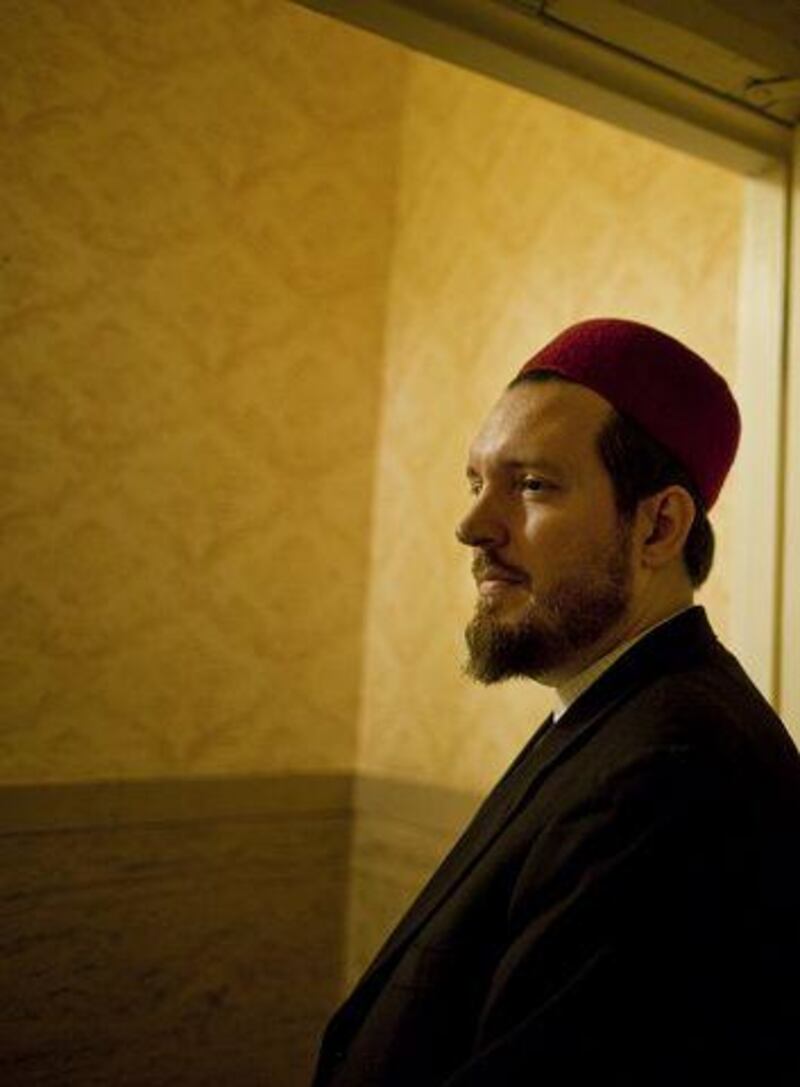ABU DHABI // Jihad Hashim Brown, 39, is a man who deals in ideas. Through his work at the Tabah Foundation, where he is director of research, overseeing the writing of reports intended to create a balanced Islamic dialogue in a rapidly changing social and cultural environment, he maintains that actions are nothing without corresponding ideas.
"Actions are empty in and of themselves," he says. "It is what we infuse within them which brings them to life." He reiterated this point by quoting Ibn Attar, a famous Moroccan scholar, who once said: "Actions are like upright forms and their life is the secret of sincerity within them." The point was, it was not the physical expansion of infrastructure over the last decade in the Emirates that mattered most, but rather the way in which the new buildings have and will be filled.
"When you mention the name Abu Dhabi, it conjures up an image of Promethean infrastructure expansion that is undoubtedly an incredible achievement for the Emirates," Mr Brown says. "But the real change has come from the life that is given to them by what is put inside them. "Abu Dhabi has a wider vision than just the skyscrapers it has built. The aim is to expose people to other experiences and other projects. It is amazing that we will be able to visit a branch of the Guggenheim and Le Louvre within the Middle East but even more so to see it in conversation with other forms of regional art that will give meaning and depth to the culture here."
Mr Brown, originally from America, has lived in the region for 20 years. In 1989 he moved to Damascus to study Arabic grammar and Islamic theology and there he started his family. In 2004, he, his wife and four children moved to Abu Dhabi, where Mr Brown eventually took up his post at the Tabah Foundation a non-profit organisation that advises the Islamic community on a modern and engaging discourse and is committed to training new scholars.
In addition to advancing the Islamic community, Mr Brown also expanded his own family in the UAE; his fifth child was born in the capital. "Abu Dhabi seemed like such a welcoming place with a very peaceful environment," he said. "Plus the Emiratis I knew were very gentle and thoughtful people." It was important for his American children to receive a more international education, he said. "My three daughters speak fluent Syrian Arabic and I am trying to teach them the classical Arabic at home," he said.
"My two sons, the youngest children, speak much less Arabic now they are living here, but will benefit from a more international education." Over the time Mr Brown has been in the Emirates, he has witnessed a great deal of change. "What other societies took centuries to do, the UAE has achieved at hyper-speed, and it has thrown large sections of society into culture shock," he said. Mr Brown cited education, the arts, the diversification of assets beyond natural oil and gas resources and the investment into human capital as some of the best things to come out of the decade.
"The fact young people are being selected from families and sent abroad for education is very important to the improvement of the country," he said. "In the future it will be beneficial to push young Emiratis to stay overseas for more time and to bring their worldly experience back home." The result of these rapid changes, he said, is that Abu Dhabi and the UAE are being thrust into the regional and international spotlight. With that comes the responsibility of leadership, he said.
"In the Muslim tradition we have an understanding that with material success comes a moral responsibility," he said. "Abu Dhabi and the UAE are household names now; people are watching." Mr Brown stressed that this was not a philanthropic duty, because the Emirates and Sheikh Zayed were doing a lot for those less privileged a long time before the rapid physical expansion. What the Emirates must show, he said, is regional, international and domestic leadership.
"On a regional level, the UAE can now demonstrate to the rest of the Middle East the possibilities of good governance," he said. "They can also take the lead in showing the region how to move forward culturally whilst maintaining continuity. "Rather than importing foreign culture they can augment and add value to the story of the Middle East. "Internationally they are uniquely placed to promote respect for the Arab Muslim identity and can take leadership on how to use wealth in harmony with the environment and social justice."
In the centre of a much more globalised world, the UAE could set a "new leadership model", he said, and contribute towards peace in the Middle East by advocating fair treatment for all. Within the country, the UAE has progressed with a very steep learning curve, he said, and the future has been about sustainability. "The Emirates has an ambition to be a great nation and great nations are built on great souls, not just great minds," he said.
"A human being is made up of mind, body and soul, and I believe Emiratis have a consciousness of that. The challenge of the future will be how to integrate that into the rest of the rapidly developing country. "Just as we can't have the famine of the body neither can we have one of the mind or the soul. We need to keep on our toes as we continue to expand and work on a holistic vision of reality. "These are the things we need to work on as the expansion of the country continues."
@Email:aseaman@thenational.ae






